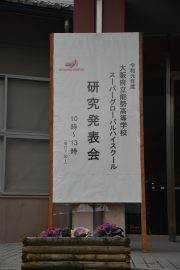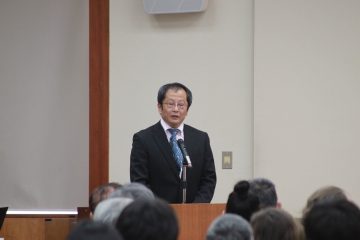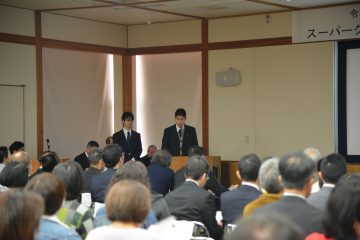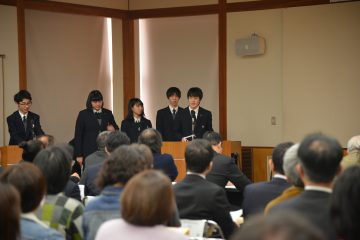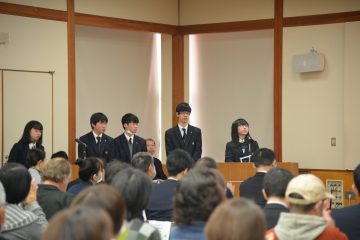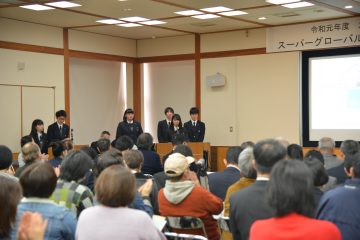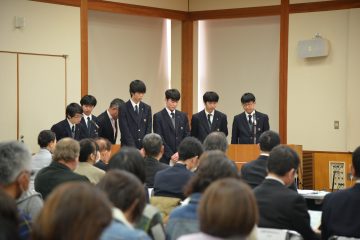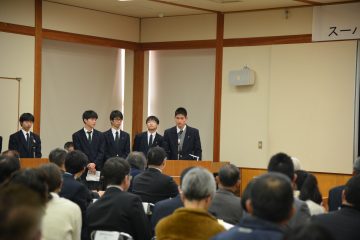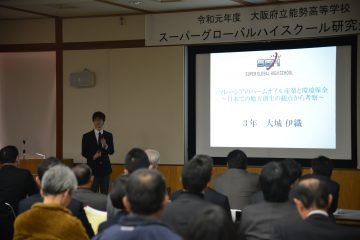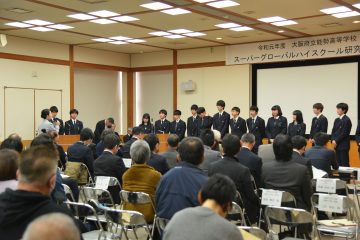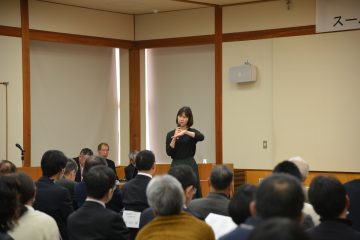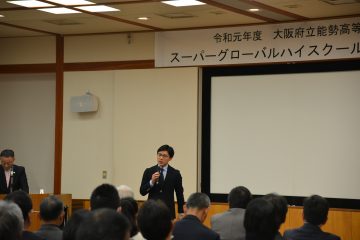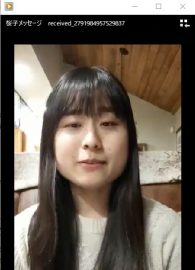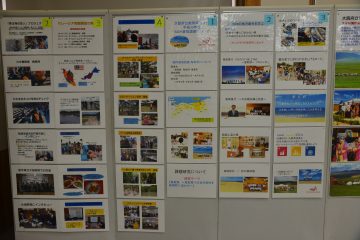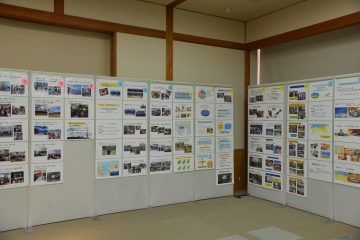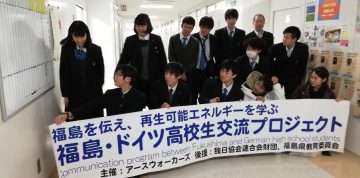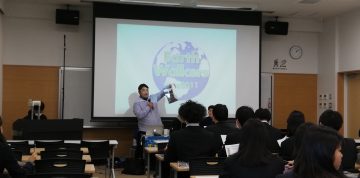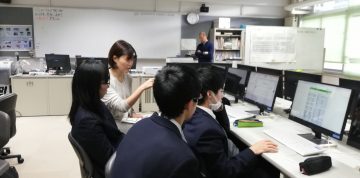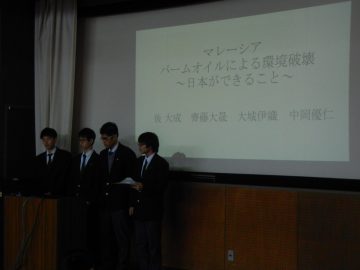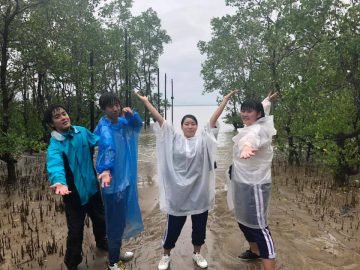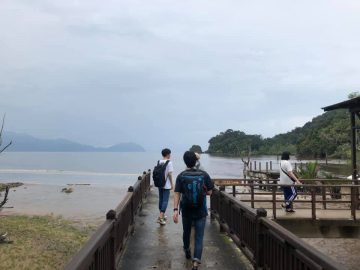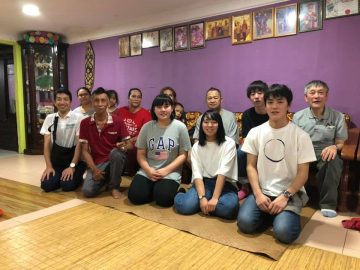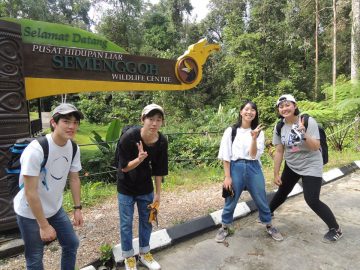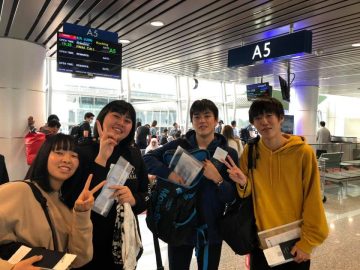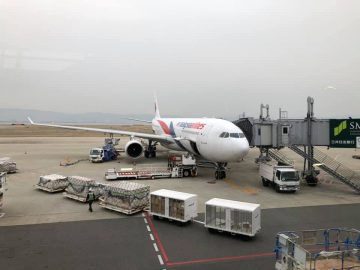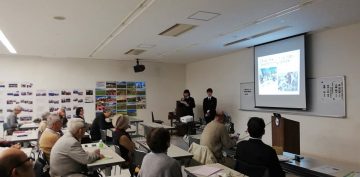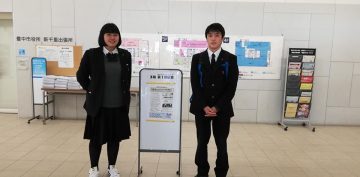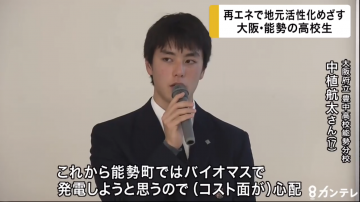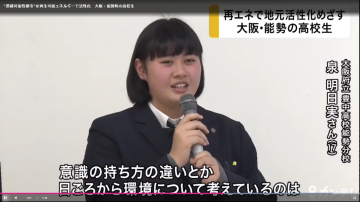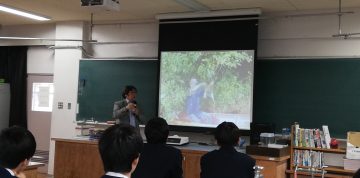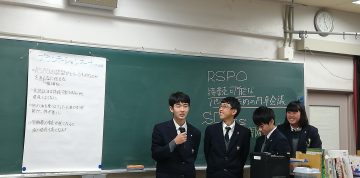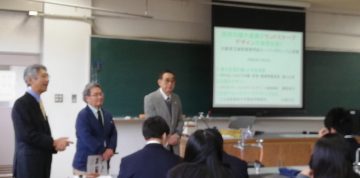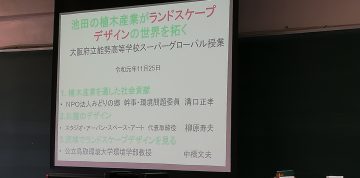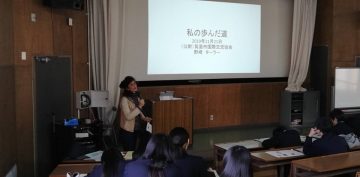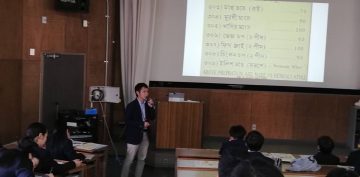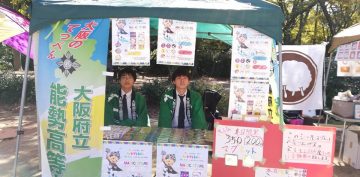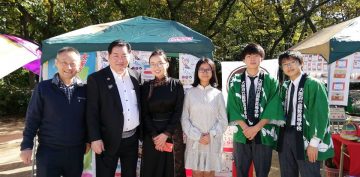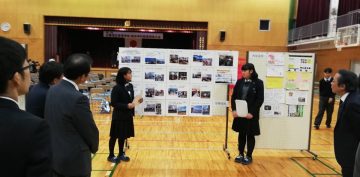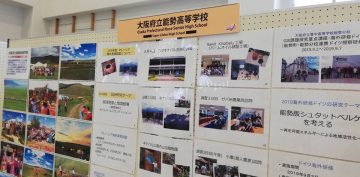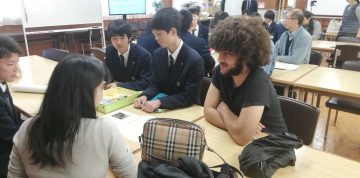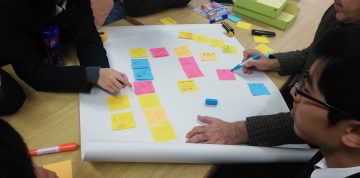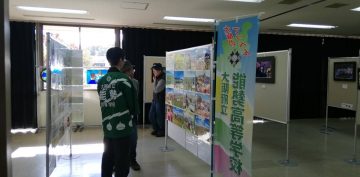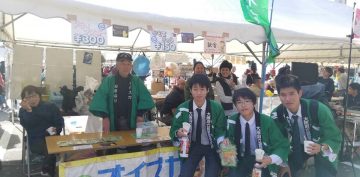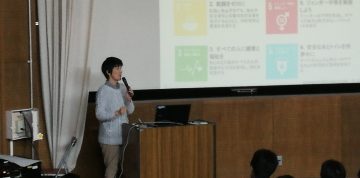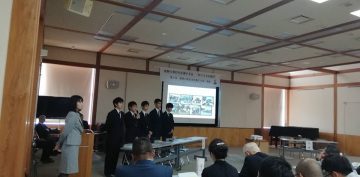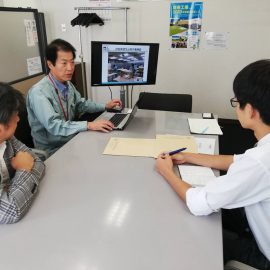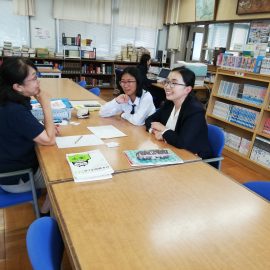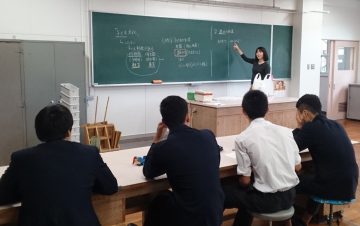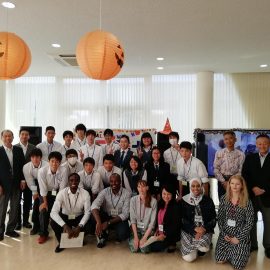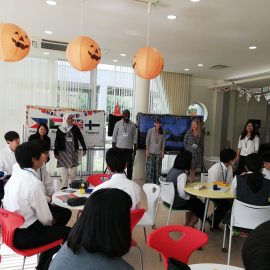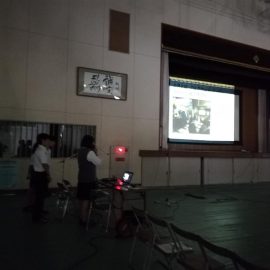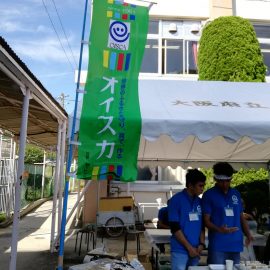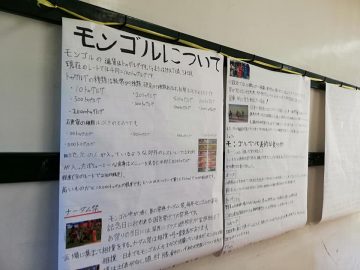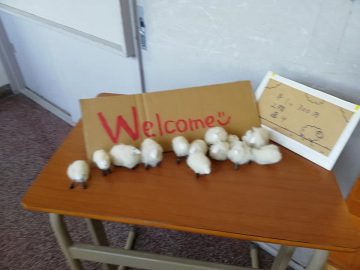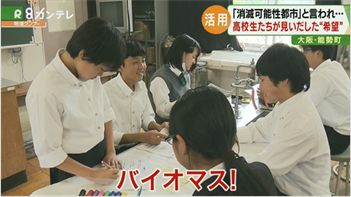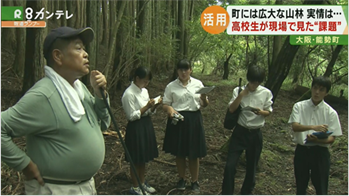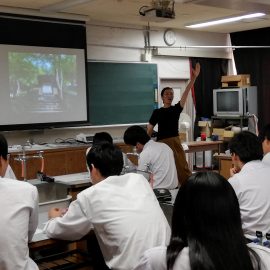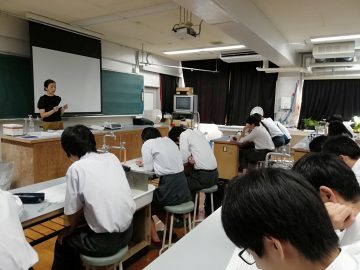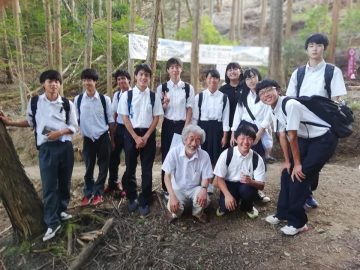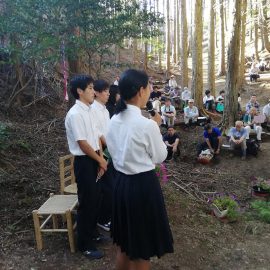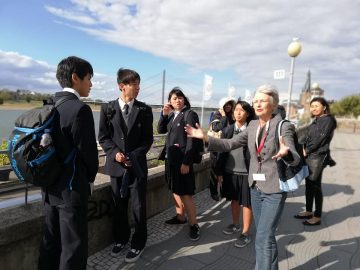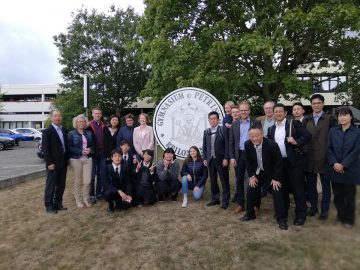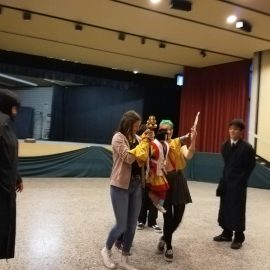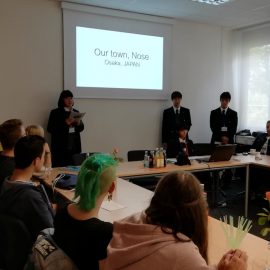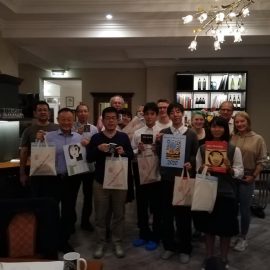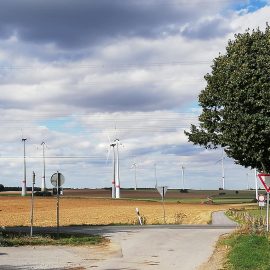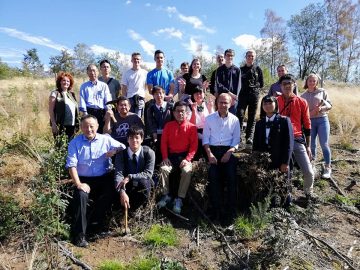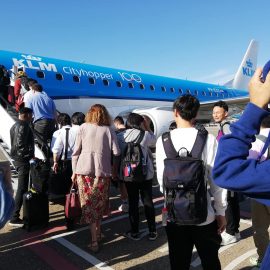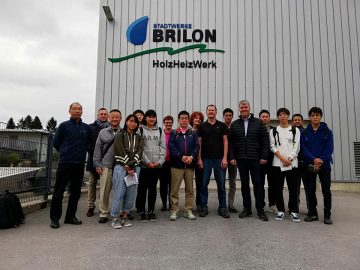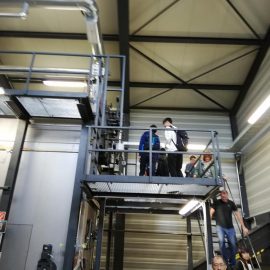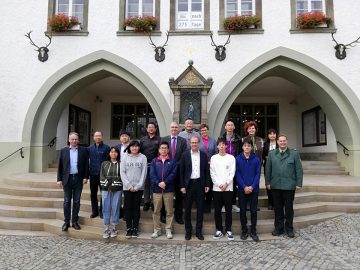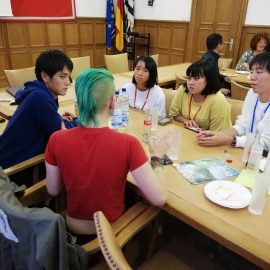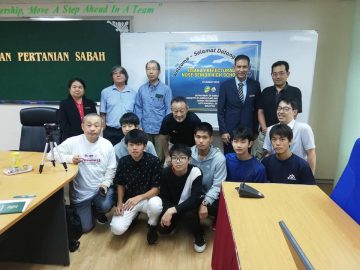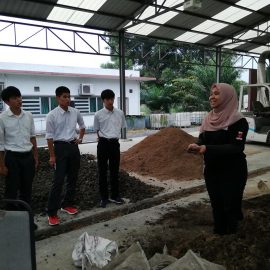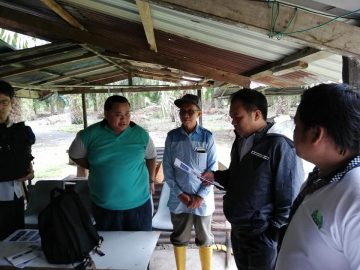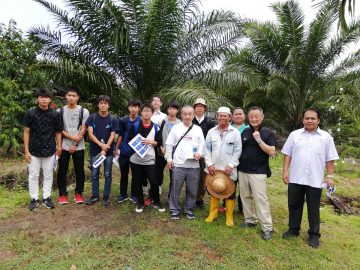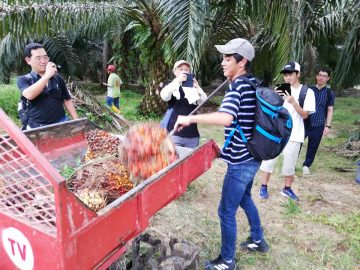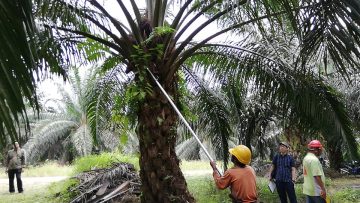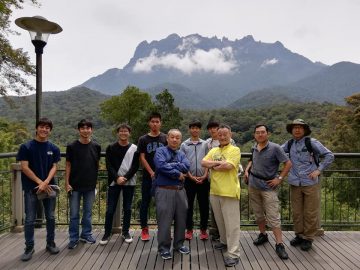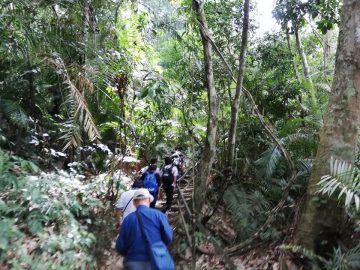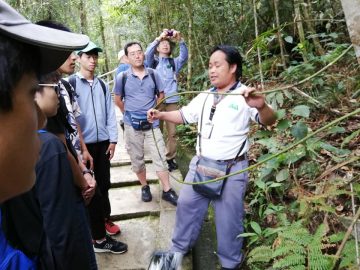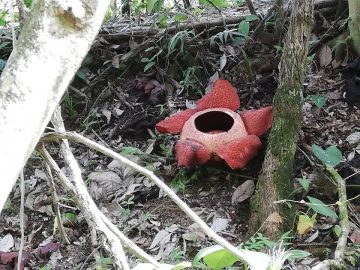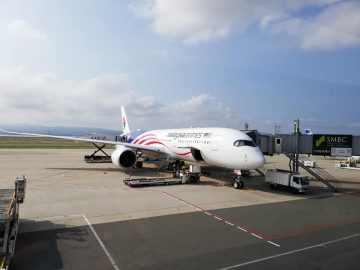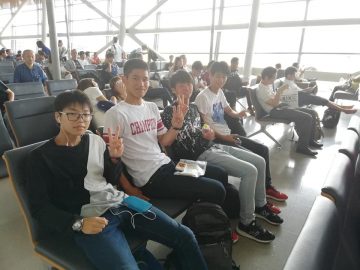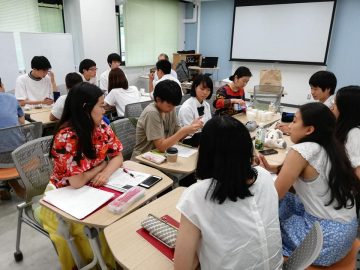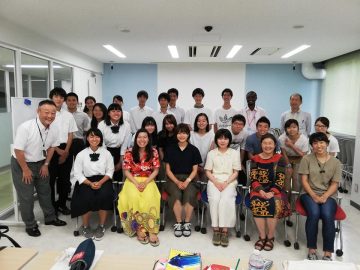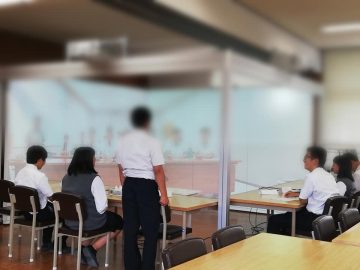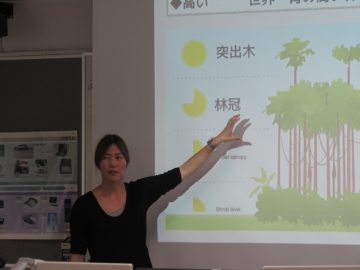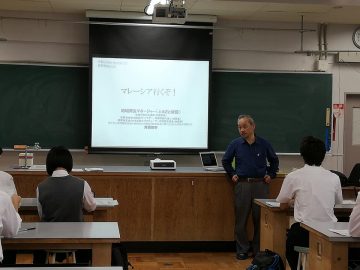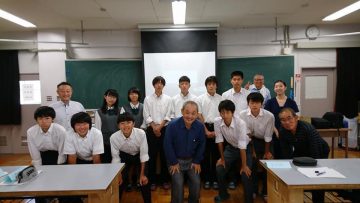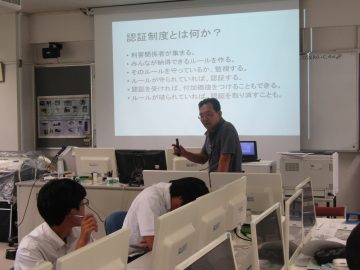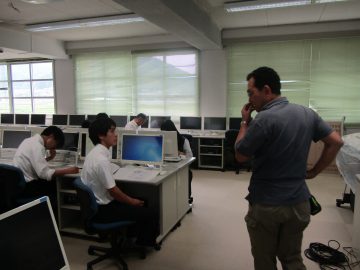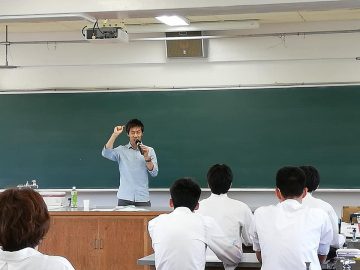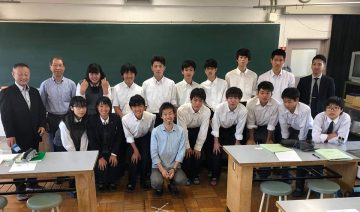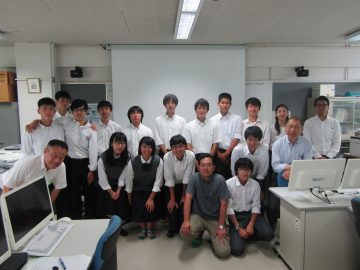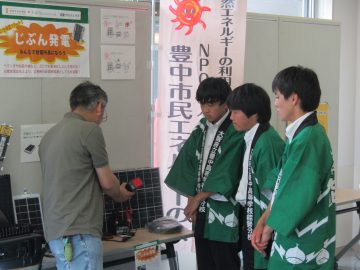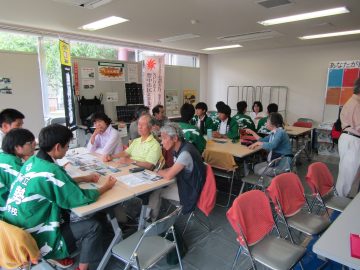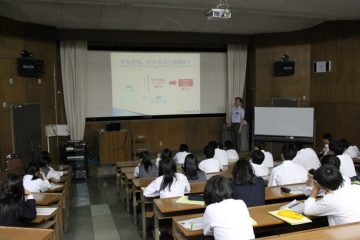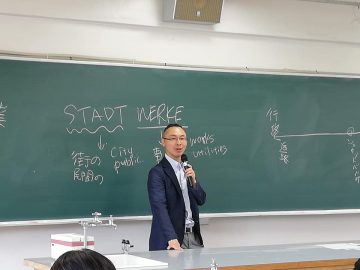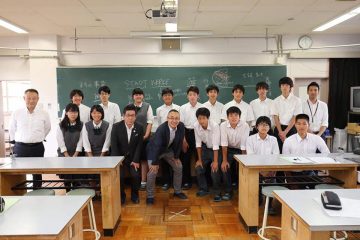Super Global High School “Topics” 2019
The Super Global High School research presentation session 2019
On February 15th, Saturday, we held the term-end presentation session of the SGH research projects at the Nose’s Joruri Theater’s small hall.
Our school was designated as a Super Global high school (SGH) by the Ministry of Education, Culture, Sports, Science and Technology in 2015, and has been engaged in research and development with the theme: “Using global human resource research to foster good judgment and practical implementation at the site of international cooperation”. In the school year 2019-20, which is the fifth and final year of SGH programme, four of the 3rd-year students participated in the Super Global Study (SGS) lecture series themed “the relationship between economic growth and natural destruction: considering the case of plantation development and forest destruction.” Various instructors gave the students lectures, and the class has been working on researches, incorporating local perspectives into global issues. Meanwhile, the 2nd-year students have attended GS (Glocal Study) lecture series, a derived course from SGH curriculum, and have been studying with the theme: “Thinking about the Nose Version of Stadtwerke: Regional Revitalization Using Renewable Energy by High School Students”, collaborating with Nose Town municipality as well as having guest lecturers’ instruction.
The contents of the day were as follows:
1.Opening speech by the principal, guest introductions and report of SGH 2019 programme
Opening speech by school principle Mukai
2.Introduction of the support committee
3.English-language presentation prepared for the National SGH Student Forum
“Economic Development and Environmental Destruction: Oil Palm Plantation and Deforestation”
This is the research project presentation prepared for the National High School Student Forum held at Tokyo International Forum. The students presented focusing on palm oil plantations and forest destruction, and environmental preservation measures.
3rd-year students: Ushiro Taisei, Ogi Iori
4.An international research report by 2nd-year students of GS Focused Topic Research class (derived course from SGH curriculum of Nose Branch of Toyonaka HS)
“International research report of Sarawak in Malaysia”
This group presented its exploration in Borneo and Kuching, which was done this January, ahead of the school excursion in Malaysia.
2nd-year students: Asumi Izumi, Rio Takeda, Kota Nakaue, and Hansuke Nakao
We also showed the video of “FNN Live News it!” from Kansai TV, which was broadcasted on January 11, 2020, Sat.
5.The 2nd-year’s GS Focused Topic Research presentation, Nose branch of Toyonaka HS
“Thinking about the Nose Stadtwerke: Renewable Energy and Regional Revitalization”–
●”A Potential of Thinned Wood”
The students focused on the forest that occupies 80% of Nose Town, and on the thinned wood. They researched its potential in use.
2nd-year students: Ryuto Onishi, Emi Morimura, Miki Yasue, and Yushi Moto
●”High School Student’s Advocacy: Future of Nose Learned from Germany”
This group presented their consideration how to use what they learned in a German field study last summer in cooperation with Nose Town to help Nose’s regional revitalisation.
2nd-year students: Asumi Izumi, Rio Takeda, Kota Nakaue, and Hansuke Nakao
6.The 2nd-year’s GS Focused Topic Research presentation and SG Focused-area lecture presentation, Nose branch of Toyonaka HS
“The relationship between economic growth and natural destruction: considering the case of plantation development and forest destruction”
●“Rapidly increasing Palm Oil demand”
Among the vegetable oils produced in the world, palm oil has become the largest for the market scale and the production amount. This topic research examined the reasons and background for the surge in demand.
2nd-year students: Shuhei Goda, Koki Nagamine, Takumi Hattori, and Daiki Yagi
●“Rainforest and Oil Palm Plantation: What is A Sustainable Production?“
They focused on the impact of palm oil production in Malaysia on the environment and the measures taken to address it and examined the balance between economic development and environmental preservation.
3rd year students: Taisei Ushiro, Ogi Iori, Taisei Saito, and Yuji Nakaoka
7.The 3rd Year’s SG Focused-area lecture presentation
“Malaysia’s palm oil industry and environmental protection: consideration from the perspective of regional revitalization in Japan”
The group focused on a company in Malaysia that produces and sells soap using palm oil produced in an environmentally-friendly and sustainable way, and then proposed a business proposal to establish a soap company in Nose Town using the same production method.
3rd-year student: Ogi Iori
8.Students’ reflections on the day
Each student telling their impression and thought
9.Feedback from SGH support committee members and instructors
Ms. Yoko Inui from Osaka Kyoiku University
10.Messages from graduates reviewing last 5 years
Our alumnus Ms. Syoji
The video message from Ms. Oshiro, a graduate currently in Canada
11.The final speech by the school principal
12.Closing
Poster display at the hall
Along with the presentation session, we had two alumni have a say on SGH. A graduate who was participating in the first batch of SGH curriculum and is currently a 3rd-year student of the Department of Social Entrepreneurship, School of Human Welfare Studies, Kwansei Gakuin University, made a speech that her learning in SGH had a great impact on her decision to choose the university and future career goal. Meanwhile, another graduate from the 2nd batch of SGH, who is studying at School of Education, Kansei Gakuin University, also sent us a video message from Vancouver, Canada telling us that she decided to study abroad by taking SGH lectures.
Many people, including the local residents and those who cooperated with our SGH programme, visited the presentation session and had time to think of the world’s issues together, as well as the potential of Nose Town. We would like to thank to every instructor who gave us lectures for this school year, and the local people who gave us tremendous support. The insight cultivated through Nose HS’s SGH programme will be succeeded in Glocal activities of Nose Branch of Toyonaka High School for further contribution to education.
Discussion about renewable energy with students from Fukushima pref.
On Saturday, February 1st, two students from the Glocal Studies focused-area lecture visited Osaka Gyoko High School in Kawachi-nagano City to participate in an activity report session of the Fukushima-German High School Student Exchange Project. The host of this session, NPO Earth Walkers, has been running the project called “Talk about Fukushima and learn about renewable energies” for five years, sending high school students from Fukushima prefecture to Germany. That is why a teacher of Gyoko High School invited us to the debriefing session when he heard that our 2nd-year students had also visited Germany for studying renewable energy.
High school students from Fukushima prefecture, who visited a German city hall and a high school, and Mr. Kodama, the NPO representative director came up onstage to talk about the current situation of Fukushima after the Great East Japan earthquake in 2011 and the current Japanese political stance that the nuclear power plants aren’t disposed even after the series of the accidents and damage. According to their opinion, the Japanese government has conflicting energy policy with environmental conservation. After the presentations, Nose HS students had a chance to talk with students from Fukushima so they learned more deeply about what other students have learned as well as they could relate a lot from their own experience.
3rd year’s SG / 2nd year’s GS focused-area lecture: preparation for the final presentation
In the sixth classes on 3rd, 10th, and 12th February, we welcomed Ms. Yoko Inui from Osaka Kyoiku University for 3rd-year’s SG and 2nd-year’s GS focused-area lecture series. The classes were dedicated to preparing for the upcoming research presentation on February 15th. Students worked on how to combine newly-risen insight and questions since the January exploration in Borneo and the school excursion with the formally developed presentation material. Students seem to have been nervous as the day of the final presentation approaches, but they are still trying their best to put all of their learning of the year together. They were also very serious when they listened to Ms. Inui giving them feedbacks. We are looking forward to our presentation session and meeting you there!
Research presentation session of 3rd-year students
On Monday, December 23rd, all of the third-year students had the 66th Batch Research Presentation Session. The students, divided into small-sized groups according to each subject choice, appeared in front of their class mates to perform the presentations about what they were studying though an entire year.
The presentation themes were:
“All about Jam” by Animal Usage division of Food, Flowers and Communication course;
“Sleep and Health” and “Diet” by Human and Environment course;
“International relationship situation in the Korean Peninsula” by Humanities and Science course;
“Evolution of Games” by International and Information course; and
“Environmental destruction caused by palm oil production in Malaysia” by SGH (super global high school) programme.
Even though each time slot was as short as 5 minutes, all student groups with successfully organised presentations made their best efforts to summarise their one-year-long research and culmination in their three years of study in the courses.
Participated in the 2019 SGH National High School Student Forum
On December 22, two SGH students participated in the National High School Student Forum held at Tokyo International Forum. SGH students from all over Japan gathered together to present the result of their research in English. The presentation theme of Nose HS students was “Economic Development and Environmental Destruction: Oil Palm Plantation and Deforestation”. They talked about the requirements to achieve sustainable palm oil production and the necessary actions of consumers.
Our foreign language assistant Mr. Dapo also came over to help the students and supported them to practice until the start of the presentation. After the on-stage presentation, the juries of the session especially appreciated our students’ viewpoint in terms of the research topic setting. In addition to the presentation session, the students had group discussion in English. It seemed to have attracted the attention from other students while Nose HS students were introducing Nose and the local revitalisation of the town. The forum was a great opportunity for Nose HS students to have an objective review of their own project, learning from other SGH schools and their projects.
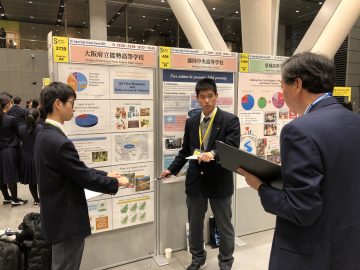
Glocal Studies Overseas Research Trip to Malaysia (Day 3)
January 19th was the final day of the overseas research trip. In the morning, we visited Bako National Park, the oldest natural park in Sarawak. Bako National Park is home to a great variety of species, including proboscis monkeys; you could say here reside most types of the animals and plants found on Borneo. Therefore, naturally, we were very excited at the visit.
The rain had continued pouring since the morning, and during the boat ride to reach Bako National Park, it became much heavier. We waited for about an hour but it wouldn’t stop, so we started our trekking in raincoats. Though we had to go through a bumpy and muddy road with large puddles, we were lucky enough to see proboscis monkeys that only live in Borneo! It was such a fulfilling experience.
Through the tough visit due to bad weather, we finally headed for Kuching airport in order to join the main group of school excursion participants. However, after we boarded the plane, we were announced some trouble happened at Kuala Lumpur airport. Therefore, our place had to stop at Penang Island. About three hours later, we arrived in Kuala Lumpur and finally, we conjoined ourselves to the school excursion unit at the hotel.
Glocal Studies Overseas Research Trip to Malaysia (Day 2)
Our morning destination of Saturday, January 18, the second day of the trip was Rayu Iban, a village about a 40-minute drive away from Kuching city where our hotel is located. It was raining early in the morning, but luckily the rain halted when we were about departing. The destination village holds the descendants of the Iban tribe, formerly known as Malaysia’s largest headhunter tribe. Through generations, the Iban people have lived in a multiple-dwelling house called ‘Longhouse’ in the rainforest of Borneo. In this area, the environment is so severe that people cannot live alone. That factor drove the formation of the communal Longhouse, where the villagers live literally under one roof.
Mr. Insil is a farmer who owns approximately 500 oil palms and he kindly had us visit his field. The whole family including Mr. Insil’s son, who is now taking care of the field, welcomed us and passionately talked about the various aspects of oil palm about an hour. Their talk topics ranged from their farmland, their crops, and their own life stories. Then, as another farmer came over, we also had an opportunity to listen to him. Thank you, Mr. Insil and family, we are very grateful! By learning from the ones who are actually growing oil palms, we discovered the gap between the reality and the knowledge we gained in Japan.
In the afternoon, we visited the Semenggoh Wildlife Rehabilitation Center, which shelters rare animals such as orangutans. It is located in the oldest forest reserve in Sarawak. We walked in the sultry jungle expecting to see wild orangutans, but unfortunately, we could not.
Glocal Studies Overseas Research Trip to Malaysia (Day 1)
From January 17th to 19th, four 2nd-year GS students explored Borneo and Kuching for conducting the overseas research, ahead of the school excursion. The research theme was the same as last summer’s trip: “the relationship between economic growth and natural destruction: considering the case of plantation development and forest destruction”. One of the members has already participated in the summer study trip and all four to Germany in September.
On January 17th, the students departed from Kansai Airport. Taking six hours to Kuala Lumpur, transiting there, they arrived safely at Kuching Airport in the evening. After dinner, the students arrived at the hotel then had a meeting. It was a tough day with a lot of traveling all day long, so we all made sure to take enough rest for the next day.
Presentation at Senri Collaboration University Course
On Saturday, January 11 of 2020, two GS (‘Glocal’ Study) students participated in the “Senri Collaboration University Course” at the Senri Cultural Center “Collaboration” in Toyonaka City as presenters. This course invites lecturers from various fields and conducts lectures to citizens. Senri’s citizens ‘executive committee members, who saw Nose HS students’ projects on the Kansai TV program “Houdou Runner” broadcasted in September, invited them as presenters. The lesson attracted a lot of people’s attention, and Kansai Television staff also visited for coverage again.
The students gave a presentation on the theme of “Thinking about the Nose Version of Stadtwerke: Regional Revitalisation Using Renewable Energy by High School Students”. During the given 90-minute allocation, they first showed the video of NHK program “Ohayo Kansai” which featured Nose NS in 2016 with the title of “Super active high school exists in a depopulated town…why are they notable?” After that was the introduction of Nose High School/ Toyonaka High School Nose Branch, and Super Global High School programme. Then again shown was another TV programme “The Challenge of High School Students in Nose Town-Turning Forests into Renewable Energy,” broadcasted in September last year on Houdou Runner. Lastly, the students gave a presentation on their visit to Stadtwerke in Germany. During the question and answer session, participants expressed opinions and agreement with the project as well as asking questions.
It was a good strategy to deliver the talk with the presumption that Nose town is not very known even though it is located in Osaka prefecture as well as Senri area. One of the students even improvised to make jokes during the presentation and it successfully created a positive atmosphere among the audience. It was motivating that the students received many supportive messages for their future projects through this session. This opportunity also helped students to clarify the explanations about the reason why they visited Stadtwerke and the direction of their future projects.
3rd year’s SG / 2nd year’s GS Focused Area Lecture at Saraya Co., Ltd.
On November 27th, we welcomed Mr. Shohei Kotsuji of Saraya Co., Ltd. for an SG and GS focused area lecture. He delivered a lecture about Malaysian palm oil and RSPO. Saraya, being well-known for its detergent product called Yashinomi Senzai, is working on environmental conservation in the raw material producing area of Borneo, Malaysia as a company that uses agricultural materials from there.
The topic was familiar for participant students because three third-year students and one second-year student explored a palm oil plantation last August in Kota Kinabalu. Also, four students from the 2nd-year GS class are going to visit Kuching, Borneo in January for studying an oil plantation ahead of the school excursion to Malaysia.
In the first half of the lecture, we learned the background of the rapid growth of palm oil production in Malaysia and the Roundtable for Sustainable Palm Oil (RSPO), a non-profit organisation that is promoting production and use of sustainable palm oil. In the latter half, the students played ‘the stakeholder’s game’; they were allocated into four groups labeled with different stakeholders, namely, forest residents, environmental NGOs, consumer goods manufacturers, and plantation owners. The students had to present opinions from each position to find different aspects from different perspectives and the difficulty to make what all of your expectations happen. Mr. Kotsuji commented, “This game is a microcosm of what is happening in Malaysia now.” Even though it is hardly possible to find a settlement way to convince everybody, we gained learning about the importance of understanding various thoughts from different positions.
“The World of Landscape Design” the First Year’s GS Focused Topic Research Basic
Course
On November 25, we invited Fumio Nakahashi, professor of Environmental Studies, Tottori University of Environmental Studies, Masataka Mizoguchi, board member of NPO Midori no Sato, and Toshio Yanagihara, directer of Studio Urban Space Art to talk about the gardening plant industry in Ikeda city and its contribution toward landscape design.
Mr. Mizoguchi and Mr. Yanagihara, who work on landscape gardening described past experiences of their career in Japan and overseas, showing some real garden sketches. Students looked surprised to learn the process of how they realise the design of a garden into the real world. The lecturers had students try to make a design sketch; it eventually taught them the difficulty of designing and visualising a garden.
Also, Mr. Nakahashi explained the ubiquitous importance of city planning with consciousness toward the landscape. As urbanisation progresses around the world, more effort will be needed to keep green in our lives. The fact that Mr Mizoguchi has been advocating ‘contribution with greenery’ in Ikeda city, a neighbour city of Nose town, was also inspiring for students to think what kind of project we could build using the forest and nature in Nose Town.
First year’s GS Topic Research Basic Lecture with MAFGA
For the first-year’s GS topic research basic course, we had a lecture and workshop of Daisuke Kawai and Tara Nozaki, staff members of the Minoh Association for Global Awareness (MAFGA) entitled ‘To create an area where people with diverse cultures can live together.’
The talk was about the situation in Minoh City, where 2700 foreigners from 90 different countries live and work of MAFGA to support their life and promote multicultural symbiosis. Having her roots in India and Japan and having felt uncomfortable in her childhood because of Japanese stiff society, Tara Nozaki said, “We should not be defined just by race or nationality in such a global era. The world is huge; I’d like you to have life unrestricted, free to be a global citizen.”
In the second half of the class, students formed up groups to discuss and present their learnings. The two instructors’ feedback following that helped students’ presentation more insightful about the future of global society.
Mongolian Festival at Utsubo Park
The Mongolian festival was held on November 2nd at Utsubo Park in Osaka, sponsored by the Consulate-General of Mongolia in Osaka and the Kansai Mongolian People’s Association. From our school. two of the 3rd-year SG students and two of short-term international students from Mongolia and Thailand participated to sell magnets and stickers with help from Professor Imaoka of Osaka University. It was a charity for Magic Land, a children’s shelter in Ulaanbaatar. The third-year students actually went to Mongolia last year for a study trip and visited the NGO.
A lot of people eventually bought goods from the booth, even offering donation too. The Consul General of Mongolia himself also contributed to this charity. The Mongolian international student visited and delivered the donations collected on the day to Magic Land in Ulaanbaatar immediately after returning to Mongolia.
Meanwhile the festival had a very vibrant atmosphere because Japanese sumo wrestling and Mongolian sumo wrestling were performed, the Mongolian instrument morin khuur was played, and a quiz tournament was held. Also, the two international students were unanticipatedly invited to participate in the fashion show, appearing on the stage in Mongolian folk costumes. Students seemed to have a fun and meaningful day to introduce the activities of Nose High School and make international contributions as well as having cross-cultural experiences.
- モンゴル総領事と一緒に
Poster Presentation at Kinki District General High School Education Conference at Osaka
On Friday, November 22nd, the 21st Kinki District General High School Education Conference was held at Osaka City Sakuya Konohana High School, and two of 2nd-year GS class students from Nose High School participated. The students exhibited the posters on the study trip to Germany about renewable energy and Stadtverke in September as well as photos from overseas research trips to Mongolia and to Malaysia. Since Nose high school is the only one school certified as Super Global High School among general high schools in Osaka, a lot of people including invited guests of the conference visited our space. We were also pleased that other high school students also seemed and asked questions along with other audiences.
Design Workshop with Osaka University Exchange Students
On Wednesday, November 13th, 16 of the 2nd and 3rd-grade SG / GS students participated in a design lab workshop held by Istek Cihangir from Turkey, a specially appointed professor at the Co*Design Center, Osaka University.
International students studying at the Osaka University Design Center from Germany, UK, Hungary, Canada, and Brazil joined as well. The graduate students and Professor Istek, holding a theme to contribute to social issues through design, have been conducting fieldwork in Nose Town to create a product with the chestnut powder and to make it globally appealing. Chestnuts are one of the main agricultural produces of Nose and it could play a role of regional revitalisation form the global perspective. That is the reason why we planned this workshop expecting ideas coming up from the local and young brains.
Groups of Nose HS students, Osaka Univ. students and guest creators who are a member of the project and lives in Nose worked on brainstorming all together about recipes using chestnut powder. Ideas from the international teams were various such as tempura flour made from chestnuts powder, breaking the stereotype that chestnuts should be altered into sweets, ‘Mokurin’, chestnuts-flavoured Moroccan pancake, chestnuts pasta and so on.
Participated in Toyono Festival
On November 9th and 10th, three of the third-graders from the SG Focused Area lecture students participated in the 9th Toyono Festival to introduce SGH programs. Toyono is a neighboring town of Nose and this event is organised by the “Toyo no Matsuri” Cultural Exhibition Executive Committee. The festival is to have organisations and individuals who are based and work in Toyono show what they usually practice.
This is the second participation for Nose HS following last year, and the final opportunity for Nose High School to exhibit with the name since the school will be completely merged as a branch school of Toyonaka High School. we exhibited mainly photos from Mongolia, Malaysia, and Germany, during SGH / GS overseas research trips. There were visitors from one to the next, listening to the explanations of the students eagerly, and asked many questions. It was a great opportunity to have more people learn about SGH / GS activities at Nose High School.
We also visited the booth of the Toyono-based NPO facility, OISCA Kansai Training Center, a collaborator of our school. We were treated with traditional Philippine sweets Camote Q, which we also sold at our school festival with international students!
SDGs Card Game with Ms. Miho Fujita
On October 31st, Miho Fujita, principal of NPO Minoh Children’s Forest Gakuen school visited us to deliver SDGs card game in a class of GS Focused Topic Research basic course. All of the 1st year and 2nd year students participated.
We have often seen signs of Sustainable Development Goals (SDGs) in media and streets, but it is not likely understood as our own experience. This class was planed to tell students what are SDGs are really like in an easy-to-understand and fun manner. Ms. Fujita has been certified as a facilitator for this card game and is working to spread the knowledge of SDGs through people of all ages.
Divided into groups, each player takes actions to achieve their goals such as economic growth and environmental protection by using the distributed cards. The cards contain information such as personal connections, money, time, and the environmental capacity of the earth. This game impressed students as they said, “it is difficult to balance the economy, environment, and society”, “I realised we have to take actions to change the world” and “I felt that the world didn’t work well if we acted selfishly.” Through this game, students seemed to realise the difficulty of achieving the SDGs at the same time as they learned the importance of working together on global issues.
The general meeting of Machigurumi Support Team for Nose High School
On Saturday, October 26th, 2019, our 2nd and 3rd-year SG/GS class students attended the general meeting of Machigurumi Support Team for Nose High School was held at the Joruri Theater small hall. There were approximately 100 people from inside and outside the town.
The 3rd-graders made a presentation about their overseas research trip to Malaysia in August, and the 2nd-grader about the trip to Germany in cooperation with Nose Town. Ahead of the report about the trip to Germany, the mayor of Nose Town, the head of the study tour team explained the purpose and the background to the project, making the students’ presentation easier to understand.
In the latter half of the programme, a group discussion called Future Forum was held to consider the future of Nose Town holding Nose Branch of Toyonaka High School (Nose High School will complete the status shift to a branch school next academic year term). High school students actively raised opinions in the discussion among the adult participants.
On the day at the venue, we had a graduate who has participated in the first batch of SGH curriculum and is currently a student at Kwansei Gakuin University. He told the audience how the SGH experience at Nose High School has been helpful in his university life. The presentation and discussion session strengthened the motivation of the regional revitalisation self-help team, by visualising the high school existence in Nose benefits the region itself by nurturing such insightful and active students who could contribute to the region’s future.
Visited Saraya Osaka factory
On October 15th, a 3rd grade SG student visited the Osaka factory of Saraya Co., Ltd., a chemical and daily goods manufacturer such as disinfectants, detergents, pharmaceuticals, and foods. This visit regarded as a special study excursion was possible thanks to their cooperation for our SGH programme for 5 years.
In the facility, he observed the process of making and packaging liquid detergent and soap from Malaysian palm oil while paying attention to the surroundings such as working forklifts, since there was of course not a route for daily tours.
Then the deputy manager of the factory explained the basic information and roles of factories in Japan and overseas as well as the history of Saraya. Saraya is developing its business based on the basic philosophy of prioritising hygiene, environment, and health under the slogan: Connect Through Life. The Osaka factory has been producing various goods in small quantities, and it was not fully automatic but partially manual. In 2020, the company will open a factory in Kanto area too. They are also having 32 technical intern trainees from overseas. Saraya is also expanding its corporate activities globally with a variety of ideas and initiatives; they are conducting the Borneo Environmental Green Conservation Project in Malaysia, while its Uganda factory members are working on local health and hygiene awareness activities.
The student who visited the factory joined the trip to Malaysia in August and has seen the real palm oil plantations. Now he is doing research themed Nose Town revitalisation and will present a report including the learning from this factory visit at Nose High School Festival.
Short-term exchange students from Thailand and Mongolia
Two exchange students have come to Nose high school through AFS Intercultural Program, an international youth exchange organisation. Nada Keeratitakoon from Thailand is 15 years old, and Khuslen Batkhuu from Mongolia is 17 years old. They are separately staying with the families of a third-year and a second-year students, and commuting to the school with their host sister/brothers. Their exchange programme will be about a month-long from October 5th to November 1st.
As soon as the arrival, they have had busy days here; they participated in the school’s cultural festival on the first day of the school. On the 7th of October, the third day, they went to an off-campus workshop at Tottori University of Environment with SG / GS class participant students.
Nada and Khuslen also gave PowerPoint presentations to introduce their country at the classes of GS Focused Area Research Basic course: for 1st-year students on October 16th and for the 2nd-year on October 21st. When talking about one of the most famous festivals in Thailand “Loi Krathong,” Nada played a flute-like instrument, which depicted the festival atmosphere vividly. Khuslen told he was the youngest of the four brothers and he wants to study science in Japan like one of his brother who was studying in a Japanese University. Both exchange students successfully delivered their presentations in fluent Japanese.
Although their stay will be as short as one month, we hope they will gain a lot of learning by being actively enrolled in the local community as well as events and activities with Nose HS students.
3rd year’s SG / 2nd year’s GS Focused Area Lecture 19
We welcomed Ms. Yoko Inui of Osaka City University to hold the 19th SG and GS Focused Area lecture on the 6th class on October 21st. This was the first class by her since the overseas trip to Malaysia in August and to Germany in September. Currently, the students are making slides for the SGH mid-term presentation session on November 1st, so they presented them to her to show the progress. Ms. Inui gave them some specific feedbacks: e.g. to include more concrete information and founding that we actually gained during the trip, not only the general itinerary and impression; and to use keywords instead of long sentences in PowerPoint slides for an easy read. Thanks to Ms. Inui, the students will be able to keep polishing the contents for the mid-term presentation.
Visit to Tottori University of Environmental Studies
On October 7, two of the 3rd-year SG students, two of the 2nd-year GS students, and two short-term exchange students participated in English Village at Tottori University of Environmental Studies.
English Village is set up on the university campus for the purpose of improving the English communication skills of students. There we met 5 teachers from the Philippines, Sudan, Finland, and the UK for 1 hour and 30 minutes. Not to say, the common language was English.
First, students gave English presentations; one was about Nose Town, others were about their study trips to Germany and to Malaysia. After that, we had some questions from the audience. They were quite sharp; the Finnish teacher asked if the students would like to live in Nose after graduation; The Sudanese teacher asked why Japan continues using palm oil that cannot be cultivated in Japan and leads to rainforest destruction, and if there is any alternative option.
After the presentation, we had a group interaction session, having one-on-one interviews and some discussion in English. In the afternoon, we attended a lecture titled “World Landscape” by Professor Fumio Nakahashi. He also checked our presentations of Malaysia and Germany and gave us feedback.
SG Activities at the School Festival
At the school festival of Nose HS on Saturday, October 5th, 3rd-year ad 2nd-year SG students attended the festival opening programme to deliver presentations about their research topics.
Three of the 3rd-year students talked about their overseas research trip to Malaysia in August, and four of the 2nd-year students one to Germany in September. The SGH mid-term presentation will be held in November so students are on the process of deepening the contents of the presentations right now. It was good for them to have a chance to present what they have developed by now.
On the same day, SG students stood in a booth to sell Philippine sweets “Camote Cue” with Philippine trainees from an international NGO named OISCA as well as in a workshop booth to make mascots using Mongolian wool. After the presentation session, they introduced Philipino members and Ms. Imaoka from Osaka University to inform of the booths.
The booths of the Philippine sweets and wool mascots making workshop welcomed many visitors. Also, on the school corridor walls, SG students exhibited posters of SG / GS activities and of the introduction of long-term and short-term international students. We all hope many people learned about the international activities at Nose high school.
Our students’ activities were aired on TV
On September 17th, Kansai TV’s “Houdou Runner” featured Nose town and Nose HS! The programme focused on Nose town’s renewable energy generation project with the title “The hope found in mountains: challenges of high school students in a disappear-able community.”
The broadcast team started to visit our school for this program about a year ago, when Nose school students began researching the German public company “Stadtwerke”. Through this TV broadcast, we hope the audience learn how high school students play a major role in revitalising the area of Nose Town, and eventually contribute to the future here. By the way, the public electricity generation system is already taken in Shimokawa town, Hokkaido, and it has been introduced in the program as well.
Regarding renewable energy, especially biomass power generation and heat generation using forest materials, we Nose High School will continue working closely with Nose Town. Although it was not mentioned in the program, four of our students joined the study trip to Germany organised by Nose Town in August and visited Stadtwerke in Brilon, Dusseldorf. Seeing the field of renewable energy by themselves will also help further research of our students.
Check the link to learn the programme details!
https://www.ktv.jp/runner/backnumber/20190917.html
Lecture by a Nurse of the Doctors Without Borders
On September 16th, we visited the fair trade shop /cafe “Espero Nose” to attend a lecture given by Masafumi Sato, who worked as a nurse of the Doctors Without Borders (MSF). The participants were four of 2nd-year GS focused area lecture students and a former Malaysian exchange student, who was visiting us. Mr. Sato, a nurse living in Mino City has worked as an operating room manager for the medical NGO Doctors Without Borders in Mosul, Iraq for six months from December 2018 to May 2019.
Mr. Sato taught us the real situation in Iraq as well as the medical activities, which Japanese newspapers and TV news do not broadcast. Though Mosul was recaptured from IS (Islamic State) in 2017, the security there has not yet recovered, and it seems that the refugee camp remains big because the reconstruction has not progressed well.
He also explained to us about MSF activities including the fact that they recently delivered medical care in Japan during the Great East Japan Earthquake and the Kumamoto Earthquake. Most importantly, we learned it is global citizens who support the medical volunteer team for disaster and war victims when Mr. Sato mentioned that 96% of the fund of MSF is covered by private donations.
3rd Year’s SG Basic Knowledge Course 3
On September 9th, The 3rd year students of SG Basic Knowledge Course, attended a lecture titled “Traveling will teach you” delivered by Ms. Junko Mikami. She runs a farmhouse inn/pizza restaurant called Michikusa Nose in Nose Town.
Mikami traveled around the world as a backpacker and gained experiences of homestay and farm stay. Her lecture this time was mainly about her travel through Spain. While sharing travel tips, she talked about the Basque region straddling France and Spain, Barcelona, the gastronomic city of San Sebastian, making us feel as if we were traveling there.
“Where do you want to go for your graduation trip?” She asked. Students’ answers were various: “To Thailand to see Kaofang ( a former exchange student)”, “To the U.K. to see around anime scene-related places” and “To Nara to fish goldfish”.
As Ms. Mikami has now moved to Nose Town, she also gave examples of the attractions of Nose Town, mentioning that life in Nose Town established her own lifestyle. The class was great learning of the case of a person who embodies “being glocal”, cherishing both of international and domestic experiences and knowledge.
Students gave a presentation at Shigeatsu Hatakeyama’s “Lecture in the Forest”
On Sunday, September 8th, “The Lecture in the Forest” was held by Nose Kikusumi Charcoal Club in Araki Valley of Nose town, where eleven of Nose HS students participated. Araki Valley is about 5 minutes away by car from Nose High School, and the place is familiar to Nose school students because they have been planting trees there every year. At such a place, the students had a great experience to present insights from their overseas research trips in front of Mr Hatakeyama, a great activist of nature conservation.
Mr. Shigeatsu Hatakeyama, the guest lecturer is notable as an oyster farmer in Kesennuma City, Miyagi Prefecture, representative of the NGO Mori Wa Umi No Koibito (meaning “forests are the lover of the sea”) and professor of Kyoto University. His inspiring activities are featured in textbooks of elementary school social studies classes and high school English classes. Caroline Kennedy, the former Ambassador to Japan also paid a visit to Mr. Hatakeyama’s place while in the post.
After having Mr Hatakeyama’s lecture, the second and third graders of Nose HS reported on the overseas summer trips to study deforestation in Malaysia and environment conservation in Germany. Although it was the first time to deliver a presentation merely verbally in the forest, and there was some audience sitting on the log chairs and watching at the presenters, the students were never too shy to clearly present their insights and impression from the overseas trips. We regard that sharing their experiences in such an opportunity was valuable to deepen the ideas of how to protect the forests of Nose Town itself.
GS Germany Overseas Study Trip -Day 4 and 5
September 5th was the last day of the study trip. We visited Gymnasium Petrinum, the high school in Brilon again. On the day we had a supporter of our programs, Ms. Cloer, who resides in Düsseldorf and arrived at Brilon in the previous evening. She has an aunt in Nose town, who is working as a tourism volunteer. That is how Ms. Cloer in Germany was introduced to us.
We started with a presentation made by Nose school students with the help of GP students. In response to this, a student from Brilon said, “it was my first time to listen to Japanese, and it was very beautiful.” There were also comments such as “Japanese are very kind,” and “I had a very valuable experience to meet Japanese students.” After that students had some time to chat, where Ms. Cloer helped them to communicate in German and Japanese. They had an active discussion about various things such as current goals and future dreams. It was a great summary of cultural exchange activities at GP. Later at lunchtime, teachers, students, the principal, the vice-principal, the city mayor, city representatives, and the people who were involved in our programmes of those three days gathered together for a farewell meal. We left Brilon, unwillingly saying goodbye and promising reunion.
Our next destination was Düsseldorf. We took three hours to get to the capital city of North Rhine-Westphalia by bus arriving at 16:00. Ube and Mr. Kai welcomed us there again. The city’s tourism guide, Fujiwara, showed us around and told us about the 730 year-long histories of the city, the environment of the Rhine, and the design of the church. Along the river Düssel, there is a busy downtown, so we also went there to enjoy shopping at department stores and supermarkets. Immermann Str is overwhelmingly filled with many Japanese restaurants, bookstores, and grocery stores so we were almost believing that we had been back in Japan. Düsseldorf has the largest number of Japanese companies among German cities, and 5,000 Japanese people live there. We found it an attractive city where history, tourism, and large-sized urban functions coexisted well.
In the evening at Brauerei Schumacher, a brewery having a restaurant inside, we participated in the farewell party held by North Rhine-Westphalia state. It began peacefully after greetings by the state’s director-general of the Environment and Agriculture Department, the mayor of Nose, and the Japanese councillor for Germany. With the attendance of the consul Mr. Kai, Ube and his colleague staff, Taguchi, a journalist and interpreter from Hanover, and Ms. Cloer from Düsseldorf, we had time to look back at these four days while having German sausages and pork.
On September 6th, we left the hotel at 8 am after breakfast and headed to Düsseldorf Airport. We had a transfer in Amsterdam and had no more trouble on the way home. All of us arrived safely at Kansai International Airport on the morning of September 7th.
Thanks to the support of the embassy of Japan in Germany, the consulate, the North Rhine-Westphalia State Government, the city of Brilon, Gymnasium Petrinum and many others, this study trip was realised with valuable experiences, a lot of learning and insight. Visiting Stadtwerke was the main purpose but our experience was much more than that. We, Nose HS, in collaboration with Nose Town, will continue working on renewable energy use to carry on that in Nose Town.
GS Overseas Study Trip in Germany Day 3
On the morning of Tuesday, September 4th, we headed to Gymnasium Petrinum a high school in the city of Brilon. Immediately after the arrival, the principal explained about the school, followed by a presentation by the students at the school about how high school students are conducting environmental awareness activities for the citizens of Brilon. Students from Nose HS also gave presentations in English. Also, we demonstrated a ningyo joruri play using dolls carefully brought from Nose-cho. German high school students and teachers also tried the performance and appreciated the theatrical culture. After that, we were guided around the school, participated in classes, and had lunch together in the cafeteria.
In the afternoon we hired a bus to the Brilon Forest. We were told there that forests are closely linked to people’s lives in Germany, and people often go hiking on weekends. In Brilon, children receive forest education since they are young and learn about natural systems and forest creatures while touching materials such as fox hair, deer horns and skulls. Nose HS students experienced the same kind of nature education session. This time, we also planted American pine trees in a mountain area damaged due to a storm. The participants planted 50 trees in total, which was not very hard for Nose students since they have done tree planting in Nose too, therefore they had enough energy to remain wearing a genuine smile. The trees will become valuable timbers in 30 years. “Please come and see the grown trees in 30 years,” our German host said. We hope that our revisit will come true. Then we welcomed some people from the forest maintenance division of the city hall, where a team of 23 experts works on studying planting and protecting the forests. From them, we learned the historical changes in German forests and sustainable forest policies.
Then we left the forest for the suburban areas of Brilon by bus. Lake Diemel is a man-made lake and the surrounding is a resort with hotels and cottages. It has been a popular destination for Dutch people as well as Germans. A power generation site with wind turbines is on a nearby hilltop, where nice winds blow. The magnificent scenery was overwhelming. Once we moved to the industrial area, we saw multiple global companies’ factories. Many of the factories operate in consideration of the environment, so the air there was very clear. Brilon seemed to us to have a good balance of tourism, environmental protection, and business promotion.
Returning to the hotel, we had a dinner reception with the attendance of the city mayor, deputy mayor, city staff members, Gymnasium Petrinum’s principal, vice-principal, and high school students. We had a great time with a lot of conversation and gift exchange. Time flies, tomorrow will be the last day we stay in Brilon.
GS Overseas Study Trip to Germany- Day 1 and Day 2
We held an overseas research trip in Germany for 6 days from September 2nd to September 7th for the Global Studies lecture scheme. This visit to Germany was organised by Nose town, and we Nose high school members had the chance to accompany the mayor and Nose town hall staff. The participant students were four of the second graders from GS Focused Area lecture course, holding the purpose of visiting Stadtwerke, which the students have been working on since last year.
In the early morning of September 2nd, we gathered at the Nose Town Hall and headed for Kansai International Airport. Since our KLM flight was delayed by one hour, we eventually departed at 11:25. We arrived at Amsterdam Airport safely after the 11.5 hour-long flight, but we found that there was little time for transit to the final destination, Düsseldorf…! Running through the security check and the immigration, we managed to slip ourselves into the scheduled domestic flight! However, at Dusseldorf Airport, another unexpected happening came to us; it turns out that all of our suitcases had not arrived. After completing the lost baggage procedures, we finally left the airport and arrived at our accommodation Hotel Rech at 21:50. None of us had a suitcase with us, but we were happy to lie down on a proper bed and take a rest before the touring starting from the next day.
On September 3rd, a bus from the city of Brilon picked us up at the hotel to the Brilon city hall because we were going to give presentations about Nose Town and Nose High School. After the mayor of Brilon introduced the city, students delivered an introduction presentation about our school in English. The mayor appreciated the presentation saying that it was well structured and informative. Next, a staff member named Ube from the state’s Environment Ministry gave a presentation on environmental measures in Germany. We also learned about the efforts toward environment conservation that German people have been taking in advance learning before the study trip, but listening to a local government officer truly made us understand the progressive attitude of Germany in the environmental domain.
We had lunch there as the mayor kindly invited us, then we headed for the Stadtwerke in Brilon, the main purpose of the visit. It was just in the distance of 15-minute walk from the city hall. Ube, another staff member named Hoppe from the Brilon City Board of Education, and many others accompanied us. Once we arrived, we had an explanation from the Stadtwerke staff about the storage of wood chips, then entered the building to see how the chips are turned into heat energy at the factory. It was a great opportunity to understand the whole picture of Stadtwerke in Brilon. After the tour, many questions came up from the mayor of Nose town, town officials, and students.
After the tour, we returned to the city hall again to attend a welcome party organized by the city. It was a great reception with many participants; we had Mr. Mizutani, councillor of the Japanese embassy in Germany, and Mr. Kai, the Japanese consul in Dusseldorf. As high school students from Brilon also participated, students from both countries seemed to have a great time speaking English to each other. They were also excited to have a high school visit next day.
Participated Online in Toyonaka High School Festival!
On Saturday, September 7th, Nose HS participated in a programme of the Toyonaka High School Cultural Festival online, using our school’s remote communication system “Smooth Space”. The purpose was that three SG Focused lecture participants gave a presentation about the NGO facility Magic Land as well as about countermeasures against poverty in Mongolia. Magic Land is a facility that we visited during the study trip to Mongolia, which shelters children suffering from abuse and poverty. Those three students also joined the trip and deepen their knowledge about social issues in Mongolia last year. Following the presentation, the students explained the honey product collected at our school farm and sold them to parents of Toyonaka High School students. These proceeds will be donated to the NGO Magic Land. It was a good opportunity to have Toyonaka High School members learn about our programmes in SGH scheme and we appreciate every purchase of our charity products!
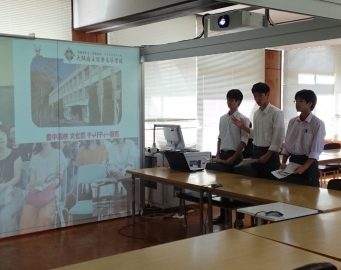
SGH Overseas Research Trip to Malaysia Day 5
On Thursday, August 8th, it was the last day of the survey. We first moved from Kota Kinabalu to Kuala Lumpur. Saying “Jumpa lagi” and “Let’s meet again” to Mr. Vie, the guide and interpreter of our stay in Kinabalu, we arrived at Kota Kinabalu Airport. There we found out that our plane would not come due to bad weather. Eventually arriving at the Kuala Lumpur Airport with three hours delay, we rushed to Putra Malaysia University (UPM).
Despite the university’s closing hour, the teachers and students were kindly waiting for us. Here we studied the palm oil industry in Malaysia. Following an English presentation by Nose High School themed “Introduction to Nose Town and the report on this study trip”, there was a lecture by a UPM teacher who received a doctorate from Kyushu Institute of Technology. He mentioned that palm oil is an important industry that supports the country’s growth and maintaining the regional economy, even though rainforest destruction is a problem. It was meaningful to hear the opinions of the Malaysian side. We also learned that the university has been carrying out various activities such as collecting waste oil to make biodiesel as electricity generation for the university.
That was the end of the study trip programme and we left the university for Kuala Lumpur Airport to return home. Although the duration was as short as 5 days, it was a rich and fulfilling research opportunity. We were able to learn the actual situation of the palm oil industry and the thoughts of local people that we would never know by just studying in Japan. After returning to Japan, we intend to deepen our knowledge through the experiences during this trip. The insights brought through the study trip will definitely improve our mid-term and final presentations.
SGH Overseas Research Trip to Malaysia Day 4
On Wednesday, August 7th, we went to the Sabah agricultural administration of the Ministry of Agriculture and Food Industry. According to the representative assistant Chong’s presentation on the situation of agriculture in Sabah, palm oil currently accounts for 87.9% of the total agricultural yield, but increase of durian and pineapple harvest is expected in the future. An active question and answer session followed.
Next, we moved to a community in Papara Village, one and a half hour drive away to the south from Kota Kinabalu City, where we interviewed small farmers with the guide of Mr. Amran from the Malaysian Palm Oil Agency MPOB. A ‘small farmer’ described here is a small-sized individual oil palm farmer who turns his land into an oil palm plantation, harvests the oil palm and delivers them to the factory. A farmer, formerly being a civil servant but having turned his own land to an oil palm told us that he still has difficulty to make ends meet just with his plantation. It seemed to be quite challenging to prioritise environmental protection in the financial situation. Mr. Amran asked us to take more palm oil in Japan to help the lives of small farmers. It is such a difficult problem without a correct answer.
After the interviews, we enjoyed Malay cuisine on the way back to the city in a local canteen before returning to the hotel. We actually had time to explore the market and the “Waterfront” tourist spots in Kinabalu City afterwards, but only three people did so because the three-day extensive research brought some fatigue to the students.
SGH overseas research trip to Malaysia Day 3
On August 6, we left the hotel at 8 am and headed to the Sawit Kinabalu factory, 130 kilometers south of Kota Kinabalu. The purpose of the visit was an oil palm field visit and interview at the factory. A local guide named Vee accompanied us. He is a Lusun tribe person from a mountain farmer family at the foot of Mt Kinabalu. As he was fluent in Japanese, we asked the reason why and found he was an agricultural trainee in Fukuoka 19 years ago.
At 10:30, we arrived at Beaufort Village where the factory Sawit Kinabalu, a semi-private oil plantation is located. First of all, we had a tour of the nursery of the seedling. They sell 80,000 seedlings annually and have a profit of 12 million yen. All of their 18 employees in the nursery are local people.
We moved to the plantation to see the oil palm harvesting. One palm fruits bunch cut from a high branch weighs 30-40kg and cannot be easily carried, it is a lot of hard work. There are 160 employees working here, and 95% are Indonesian. The size of the plantation is 1729ha, and the area exceeds 3000ha including contract farms in the vicinity. We could feel the tremendous expansion of the plantation once we made aerial photography with a drone, and also had to think of the fact that this area used to be a rainforest.
SGH overseas research trip to Malaysia Day 2
On Monday, August 5th, we left the hotel at 7 o’clock and headed for Mount Kinabalu, a World Heritage site and the highest peak in Malaysia. It is 4095m above sea level and higher than the Japanese highest Mt. Fuji. Here we met an amazing travel supporter Mr. Koizumi, a geographer who specialises in Indonesia. Prof Soda has known him and introduced to us to make this trip more meaningful. On the way to Mount Kinabalu, we visited a village where the morning market was held. The students enjoyed Southeast Asian fruits such as rambutan, durian, and mangosteen while looking at the magnificent scenery of the mountain.
Our destination Kinabalu Botanical Garden is located at an altitude of 1500m on the mountainside of Kinabalu. This is a part of the World Heritage site. The ecology of the rainforest is preserved and displayed in its natural form. Listening to the explanation of a guide, we observed the vegetation of various rainforests. Then it was lunchtime. We left the botanical garden to have a delicious Chinese meal at Mount Borneo Restaurant.
After lunch, we returned to the park with the guide again. Mount Kinabalu has the only hot spring in Sabah, so we saw people from various countries were happily bathing there. As the purpose of our visit here was to investigate the rainforest, we walked further and reached the canopy walk that contains four suspension bridges. The height is 30-50m from the ground! Looking at the deep green primeval forest from the height, we couldn’t help hoping that this tropical forest will remain in the future.
The highlight here was the world’s largest flower Rafflesia. It takes 9 months for the plant from budding to blooming, and the flowering period is 1 week to 10 days. We were lucky enough to encounter such a precious flower. The flower size was 60cm and it seemed to be on the 8th day after flowering. It was very impressive. At the end of the day, we went back to the city and had a udon dinner at the food court before returning to the hotel.
SGH overseas research trip to Malaysia Day 1
For six days from August 4th to 9th, we were in Malaysia for the overseas research trip! This year’s theme was “the relationship between economic growth and natural destruction: considering the case of plantation development and forest destruction”. We flew to Kota Kinabalu via Kuala Lumpur in order to study that.
On August 4th, the six of 2nd-year and 1st-year SG students departed Kansai International airport, seen off by our principal and travel agency staff members, The rural revitalisation manager, Mr Saito joined us onboard the same Malaysian Airlines flight.
We arrived at Kuala Lumpur Airport at 16:00, finished the immigration process and waited for departure to Kota Kinabalu. Here joined Prof. Soda of Osaka City University Geography Major, who has been teaching us for SGH classes. He was in KL to deliver a lecture at a local university. It was a wonderful coincidence and we were lucky enough that an expert like him could join our trip! Even during the waiting time at the airport, Prof Soda kindly gave us a brief lecture about Malaysia and the research topic.
We left Kuala Lumpur at 18:10 and arrived at Kota Kinabalu Airport, Sabah, Borneo at 21:00. More than 10 hours have passed since departure, but everyone was full of energy with excitement. Finally, we arrived at Hotel Shangri-La in the centre of the city talking about 15 minutes by bus from the airport. Our main learning experiences are starting from tomorrow.
Presentation session at Osaka University
●Wednesday, July 16th 2019
On 16th July Tuesday, four of 3rd-year’s SG class students, three of 2nd-year’s GS class students visited Osaka University to deliver presentations and discussion with the university students.
We were invited to the class called “the door to the academia” by Ms Ryoko Imaoka, associate professor in the Foreign Studies faculty, who has instructed our overseas research trip and its preparation. The third-year student had the research trip to Mongolia with her. The third-year students delivered the presentation based on the experience and insight, and then the second students another about Stadtwerke and their upcoming research trip to Germany.
In the class, we met 16 first-year university students from various faculties such as the School of Foreign Studies, the School of Law and the School of Engineering. We were also happy to meet different SGH school alumni in the class! We had some discussion with university students as well after the presentation. Divided into three groups, Nose HS students and university students shared opinions about the importance of education for rural revitalisation, the possibility of Stadtwerke in Nose Town, and the impact of renewable energy use. Some students brought up some actual examples of rural revitalisation projects in their hometowns. Overall, talking with Osaka university students meant a lot to our students for they exposed themselves to a little older people from different backgrounds and with different academic interest and knowledge.
SmoothSpace sessions with other high schools
●Friday, July 8th, 2019
On Monday, July 8th and Wednesday, July 10th, we spent a class to interact with Shimane Prefectural Oki Dozen High School and Miyazaki Prefectural Iino High School, using the remote network system “Smooth Space” equipped at our school. We have been using this device to take classes held at Toyonaka High School and interact with the students. This time, we reached out with high schools in other prefectures and tried out the discussion session.
On July 8th, four of the 2nd and 3rd-year SG participants talked with Oki Dozen High School students about the theme was “How to motivate ourselves and become passionate”. As students of both sides had preparation time in advance, on the day they shared their structured opinions and discussed that. Students seemed to be excited and having fun during the discussion!
Then on July 10th, next was the cultural exchange session with 26 students of Iino High School, who belong to the high school’s Life and Culture course. Our participants were 6 students who are taking the agriculture and home economics course. The conversation in Miyazaki dialect and Osaka dialect was very interesting and surprising to both sides, and it helped to understand the local characteristics well. Our online remote communication looked successful and will continue!
Third Year’s SG / Second Year’s GS Focused Area Lecture
●Friday July 3rd, 2019
We had 9th lecture of Third Year’s SG / Second Year’s GS Focused Area on 3rd July, Wednesday. The aim of the day was to get informed of overseas study trip preparation plans, and then discuss about the video titled “Rhein-Hunsrueck-Kreis – Energy revolution.” The video was shown in Mr. Kotaro Kawamata’s lecture on 2nd July and this time we watched it again to review.
Rhein-Hunsrück district of Land Rhineland-Palatinate, Germany, makes a great effort among the whole community on ‘Energiewende’ or energy transition to renewable one.
Not only the region’s CO2 emissions has reached zero in 2018, according to their calculation, they aim to achieve 100% of renewable energy rate by 2030. Our discussions session raised opinions such as “It is important that people in the region invest for their own community” and “There is a need to form an energy conversion plan that can be understood by the residents”. Since Rhein-Hunsrück district has similarities to Nose in its natural environment surrounded by forests, we recognised multiple factors that could be useful for us, such as wood biomass power generation using biomass chips.
To learn about energy transition of Rhein-Hunsrück district, watch the video here (*German audio with Japanese subtitles, English subtitle in the video owner comment )
First and Second Year’s Super Global Basic Knowledge Special Lecture
●Thursday July 2nd, 2019
On July 2nd Tuesday, we held a GS Basic Knowledge Special Course for the first and second year students. The lecturer was Mr. Kotaro Kawamata, a section manager of the Ministry of the Environment Minister’s Office Environmental Planning Section, who spoke on “pre-lecture toward Germany visit: projects of Stadtwerke”.
This course was a pre-study for Nose Town and Nose HS joint study trip to the city called Brilon in North Rhine-Westphalia, from September 2nd to 7th, 2019. We are planning to visit Stadtwerke Brilon (a public corporate owned by the local government) and interaction activities with Brilon High School in order to learn environmental issues and renewable energy, and then to think of application of them for regional revitalisation.
This course was the fourth and last collaborative open course with Nose Town. There were a lot of participants from the town. The lecture hall became full, showing the high interest of Nose residents in the Germany study trip.
In the first half of the lecture was about basic information on Germany and the city of Brilon as well as environmental energy types used in Germany now. Then he moved on to Stadtwerke and the electricity use in the municipality, mentioning domestic examples in Yonago City and Ikoma City, where the municipality is taking the lead in developing a new electric power business.
In the second half, participants were divided into groups to discuss “learning in today’s lecture” and “what to observe in Germany”. Through the session, we learned many people expect the tour members to learn local context and tacit knowledge which you can be exposed only by visiting the site.
Even after the visit to Germany, this initiative, where Nose Town and high schools cooperate, will continue in order to realize the Nose version of Stadtwerke. Stay tuned for our future activities!
Third Year’s SG / Second Year’s GS Focused Area Lecture 8
●Monday, June 26th, 2019
On Wednesday, June 26, we held the 8th third-year’s SG / second-year’s GS Focused Area lecture with Ms. Yoko Inui, associate professor of Osaka Kyoiku University, where she is researching the vegetation and insects of Borneo’s tropical rainforest at the Chemical Ecology Laboratory. Ms. Inui will instruct our research on SG/GS Focused Area course this year. This is the first class conducted by her, and it plays a role of prior learning of the overseas study trip to Malaysia in August and January.
First of all, she delivered an explanation about the Lambir Hills National Park in Sarawak, Borneo, which is Inui’s fieldwork site, in order to describe the current state of tropical rain forests. Only in this park primary forests of 100 million years remains in Malaysia, while everywhere else has been gone already. It was shocking to hear that for Malaysia, which began cutting trees in the 1960s, Japan was the largest importer of the timber.
Ms. Inui said, “People have various perspectives, therefore there are different answers to whether we need tropical rainforest or not.” Now, Malaysia is experiencing rapid economic growth, which is the same as Japan’s previous state. Many believe that deforestation is inevitable for the development of the country, so it seems that the problem cannot be solved just by calling for the need of environmental preservation. The lecture gave us more questions we want to seek for the answers in the overseas study trip.
Third Year’s SG / Second Year’s GS Focused Area Lecture 7
●Wednesday, June 22th, 2019
On Saturday, June 22, we held the 7th SG / GS Focused Area lecture with Mr. Toshiyuki Saito, a regional regeneration manager. Mr. Saito visits countries around the world, playing various roles related to regional revitalisation, such as regional revitalising evangelist (designated by Cabinet Secretariat), Ministry of Internal Affairs and Communications regional revitalisation advisor, and regional management master (designated by Ministry of Internal Affairs and Communications).
In this class, he delivered prior learning of overseas study trip to Malaysia in August, introducing important fact data such as domestic regional revitalisation projects and one of the cases in Sabah Province of Borneo, Malaysia. We had the lecture with attention, motivated to find useful factors to benefit Nose town during the study trip.
Third Year’s SG / Second Year’s GS Focused Area Lecture 6
●Tuesday June 19th, 2019
On Wednesday, June 19th, we held the third year’s SG / second year’s GS Focused Area lecture. It was the second lecture on the topic “Malaysia Economic Development and Natural Destruction” by Professor Ryoji Soda of Osaka City University.
Following the previous session, we talked about the oil palm plantation that we plan to visit in the overseas study trip in August. First, we considered the problems that plantations have, such as the environment, workers, and land use. Then the professor introduced the certification systems. In order to solve the existing problems, there is a WWF-sponsored“Round Table for Sustainable Palm Oil” (RSPO) certification system. However, companies has to spend a lot financially to acquire this certification, so Malaysia has created its own certification system called Malaysian Sustainable Palm Oil (MSPO). This is gradually spreading in the country.
Also, the professor mentioned, “biomass power generation using palm oil and coconut shells is expanding in Japan, but from the perspective of protecting tropical rain forests, I doubt that is really environmentally friendly way.” did. Everything has positive and negative aspects, thats why we have to think carefully from various aspects.
Also, we appreciate that we received specific advices on what to look at when visiting plantations in the Malaysia. The trip date is approaching, we are motivated!
Glocal Studies 1st lecture
●Sunday, May 8th, 2019
This is the fifth year of Super Global High School (SGH) designation for us. After school on Wednesday, 8th May, the first joint course of the 3rd year’s Super Global (SG) Focused Area lecture and the successor programme 2nd year’s Glocal Studies (GS) Focused lecture. ‘Glocal’ is the term of the attitude of looking at things from a global perspective and solving local problems.
In the first half of the class, Mr. Togashi, the teacher in charge of SGH programmes, explained about the future class plans, and then Mr. Uchida, our assistant principal gave a general course orientation including the purpose of the lecture. In this school year, we are going to have lectures following two themes: “Malaysian Economic Development and Destruction of Nature -Plantation and Deforestation-” and “Regional vitalisation in thinking about Nose Version of Stadtwerke -Renewable Energy and Region vitalisation-“. Mr. Uchida told the students, “Face global issues and try to solve problems from a glocal point of view without being caught up in the theme.”
In the latter half of the time, Ms Ryoko Imaoka, associate professor of Osaka University, explained the presentation to be given at “Peace Market” at Joruri Theater on the coming Sunday, May 26. On the day, the second graders will give a presentation on the German communal corporation Stadtwerke and the third graders will talk about their experience on education problems in Mongolia. Also, we learned about a citizen group working on new electric power. We will exchange viewpoints with the citizen group about renewable energy later at the timing of our presentation session.
Third Year’s Super Global(SG) / Second Year’s Glocal Studies(GS) Focused Area Lecture 3
●Monday, May 22th, 2019
On May 22 Wednesday, we held the 3rd SG/ GS focused area lecture, welcoming Mr. Yasuhiko Nakamura, a barista living in Germany, and he gave a talk entitled “How German people Challenges the Environmental Problems: from the Viewpoint of a Barista”.
This was the first lecture of a collaborative lecture series with Nose Town, since Nose town people and Nose high school students will visit Brilon city in Germany next September in order to see and learn about their stadtwerke, a public company owned by the local government. Through this lecture series, the high school students and townspeople will consider how to realize sustainable town development in Nose.
Mr. Nakamura, who has been widely active as a coffee barista in Germany as well as a consult for restaurants, spoke about the high awareness of the environmental issues. Germans are thoroughly working on reducing waste at the national level, and environmental activities are spreading from high school students to the young generation from the 20s to 40s. Even ‘No Wrapping supermarket’ seems to be trendy there.
He also mentioned about the willingness of German people toward active and voluntary social contribution. It is widespread to buy electric power from a stadtwerke despite the cheap private power companies are also available. That is, according to Mr. Nakamura, rooted in the German “love toward their local area”. It is less likely for Germans to leave their hometown because of work and school commuting. That is one of the reasons why Germans have incentives to voluntarily act for the local community.
Lastly, the lecturer Nakamura told us what we can do from now on is to be a wise consumer. The tips were concrete: to avoid the plastic shopping bag when it is not needed, to stop wasting water and electricity and to rethink over-purchasing. By the eyes of a Japanese person living in Germany, we could learn the real attitude towards the environment and the reason of the Stadtwerke pervasiveness in Germany.
SG/ GS Focused Area Lecture 4
●Friday, May 29th, 2019
On May 29, Wednesday, the 4th class of the third year’s SG/ the second year’s GS focused area lecture was held, and totally 15 students attended the class. We welcomed Prof. Ryoji Soda of Osaka City University to deliver the introduction of the class research topic: “Malaysian Economic Development and Natural Destruction”. Prof. Soda instructed us for our previous SGH research trip in Borneo in 2017.
In this class, we learned about Sabah, Borneo, where we will conduct an overseas research trip in August. First, we looked through the question “Which is more rural, Nose Town or Borneo?” to compare the area size, population, and density. We also learned the diversity with 70 ethnic groups in Sabah including Malay and various religions including Islam. (The number of existing ethnicity changes according to different definitions.) Adding to that, what made Borneo closer to us are the pictures to learn biodiversity of Borneo’s tropical rain forests, namely, the world’s largest flowers, Rafflesia, Proboscis monkeys, and Bornean Bearded Pig.
In the latter half of the class was to understand the development of oil palm plantations that are threatening the diversity of this tropical rain forest. Looking at the changes in tropical rainforests since 1950 taught us how forest areas are disappearing rapidly. The following workshop had students to observe the development of the plantation with the aerial photographs of Google Earth using the function of area measurement. Surprisingly we even found a huge plantation as big as 5 of Nose town areas (approximately 100 square kilometres). This lecture for raising the familiarity with the region will connect to students’ deep understanding of oil palm plantation issues.
Peace Market Nose 2019 (GS Research extracurricular activity)
●Wednesday, May 26th, 2019
On May 26, Sunday, 12 second graders, three third graders and one exchange student of Super Global Study (SGS) class participated in “Peace Market Nose 2019” held at Joruri Theatre. From 9:00 am, we prepared for the display of the panels about Nose High School’s SGH activities and last year’s Tottori Prefecture and Mongolia study trip.
When Peace Market was opened at 10:30, the third-grade team who participated in the research trip to Mongolia and the second-grade team who conducted a study on stadtwerke gave presentations at the stage in the lobby, having many audiences.
In addition to Nose High School, there were citizen groups from Minoh City, Toyonaka City, and Takarazuka City, and their topics were very interesting. The Action Lunch session was thought provoking to listen to and discuss in detail with people who presented on “Self Power Generation”, “Small-Sized Hydro Power Generation”, “Japanese stadtwerke” and “Strategical Degrowth of the Society”.
The students also had a chance to say publicly what they learned at the day. Some audience looked amazed by the knowledge absorption speed of Nose HS students.
First year’s GS Basic Lecture series 1
●Tuesday, June 4th, 2019
On June 4th Tuesday, the first GS Basic Research lecture was held with attendance of all first graders. As well as last year, we had Mr. Tatsushi Ishihara, director of Osaka Entrepreneurship Support Centre run by Japan Finance Corporation (JFC), a comprehensive government-affiliated financial institution, in order to deliver learning tips when we apply for a high school students’ business competition. His lecture told us the importance of four core perspectives: “Product contents”, “customer”, “management resources”, and “business balance plan”. Mr Ishihara told his expectation toward high school students are, flexible and cutting-edge social improvement ideas which are along to current social situations.
Once each student group creates a business plan focused on revitalising Nose Town, Mr Ishihara will feedback them to polish the idea.
Third Year’s SG / Second Year’s GS Focused Area Lecture 5
●Tuesday, June 5th, 2019
On June 5th Wednesday, we held the 5th lecture of the third year’s SG/ the second year’s GS Focused area lecture. We had Mr. Takashi Kubota, Deputy Mayor of Kakegawa City, Shizuoka Prefecture, as a lecturer. His talk was themed “thinking about renewable energy: developing a Stadtwerke in Kakegawa City”. This is the second lecture on the public learning course aiming for thinking town development of Nose Town. Nose HS students and town people will visit Brilon City in Germany in September and see their Stadtwerke, a German communal company, then think of the use of renewable energy to tackle environmental issues.
This lecture about sustainable town development gathered a lot of participation from inside and outside of the town, including Mayor of Nose and Dutch residents living in Nose.
Mr. Kubota used to serve as Deputy Mayor in Rikuzen-takada City, located in Iwate Prefecture, after the 2011 disastrous earthquake. Then he became Deputy Mayor in Kakegawa City, Shizuoka Prefecture, where he was born.
Kakegawa City is preparing for the start of a communal corporate based on stadtwerke system from 2021. Based on the experience of the Fukushima nuclear accident, and based on the fact that the Hamaoka Nuclear Power Station is located in Omaezaki City, within the 30km area of Kakegawa , the stadtwerke plan aims to make a power company that uses the revenue for community service
Electricity costs would go up with the renewable energy use, but Mr. Kubota believes that if enhancing the public services could become commensurate with the rise in electricity costs by renewable energy generated by a new power company, the number of users will increase.
Listening to the case of the local government actually working on stadtwerke system gave us great hints to our own stadtwerke plan in the future. After the lecture, the members of the Nose Town Office and Nose high school received a lot of advice from Mr. Kubota, since the visit the Stadtberge in Germany is planned in September.




